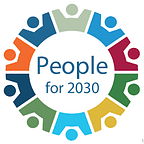Exploring the psychology behind entrepreneurship and innovation in UNDP
Meet Roxani, a Finnish-Cypriot JPO working with the Regional Innovation Team in the Arab States and with UNDP Somalia. Her role is all about learning and challenging assumptions about what works in sustainable development.
I have a background in economics, politics and migration studies. I started out my career working with the ILO on labour migration and informality. Then, at the EU’s Delegation to the African Union in Addis Ababa, I turned to gender and youth programming and advocacy. Youth is a big driver of innovation, and that’s what originally brought me to my current role at UNDP.
The first thing I love about working on innovation at UNDP is the different types of learning I’m exposed to and that I help generate. A big part of our team’s work is about enabling the organization to learn more holistically, and about connecting with “unusual suspects” who bring diverse perspectives on sustainable development. I’ve also really benefitted from UNDP’s learning offer and from the JPO training budget. I’ve taken a certification programme in monitoring and evaluation, courses on speechwriting, digital transformation, foresight, creative thinking, and more.
JPOs sponsored by Finland are usually assigned to two different duty stations during a three-year assignment. For this reason, I have worked with both the Regional Innovation Team for the Arab States based in Jordan, and with UNDP Somalia, where I support resource mobilization and strategy in the areas of innovation, youth, and disability.
I chose UNDP because of its huge presence globally: it is one of the most field-based UN agencies and the international exposure is incredible.
Another reason why I joined is the diverse mandate, and the unique opportunity the organization offers to work on integrated approaches to sustainable development.
I support 17 countries in the Mashreq, Maghreb, and Horn of Africa, but to do that effectively, I need to connect with so many others. In a typical day I might have a meeting with UNDP Somalia on disability issues; with a global Crisis Bureau team on a piece of research we’re collaborating on with University College London; with the regional rule of law team on gender justice; and with women entrepreneurs from across the Arab States participating in a mentorship programme I manage. I thrive on this diversity, but I do try to prepare for meetings in advance when I can because navigating different topics, country contexts and approaches can be challenging.
If I reflect on the skills needed to do my job, I’d say they include flexibility, a good dose of humility and openness to different ways of thinking, as well as client orientation (the regional team’s clients being our Country Offices). And most importantly, communication! Good interpersonal communication, but also the time and space to reflect on what we’re learning. I think the freedom we have at UNDP to “take off the corporate hat” and share our thinking in blog posts (of which I’ve written a few) is wonderful.
A large part of my work has been about the human connections and psychology behind entrepreneurship and innovation.
The Arab States have played host to some of the highest unemployment rates globally for several decades now. Despite its potential for employment creation, there are so many barriers to entrepreneurship in the region, even more so for women.
Since last year, I’ve had the pleasure of managing the Women Innovators Programme, a partnership with GSMA (the global mobile operators’ association) and their start-up platform 4YFN. The programme is all about connections: connecting women-led digital start-ups from the region with international business experts and investors, but also building out a network of women in digital from the Arab States who can learn from each other and serve as role models for up-and-coming entrepreneurs. I think we often overlook how important meaningful human connections can be in making or breaking sustainable development outcomes.
I’ve been exploring the psychology of entrepreneurship with ten Country Offices in the Arab States, looking at entry points for behavioural science in existing entrepreneurship initiatives. Behavioural science is an evidence-based lens that helps challenge our assumptions of how people behave in response to our interventions. It recognizes that human biases, mental shortcuts, and other barriers can get in the way of our theories of change.
During my JPO I’ve worked on applications of behavioural science ranging from the prevention of violent extremism to gender equality, from waste management to reducing unnecessary air travel at UNDP. I do hope sustainable development practice will become more attuned to psychological factors, even as we look to drive change at a systems level.
To end with a personal anecdote… back in the 70s, thanks to a scholarship from UNDP, my father was the first in his family to go to university, and through to a postgraduate level. It does feel like a twist of fate, having the opportunity to join and give back to an organization that has shaped my family’s outcomes in that way.
